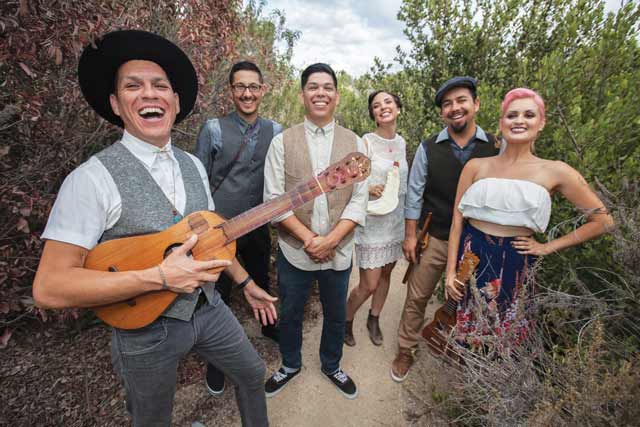Photo: Rafa Cardenas
Las Cafeteras Bring Their Beats to Payomet
by Melissa Yeaw
“Our music is a mix of African, Indigenous, Arabic, Spanish, beats, rhythms, and rhymes. It’s Afro-Mexican folk music from East Los Angeles,” says Hector Flores, singer, jarana tercera player , and Zapateado dancer in the band Las Cafeteras. Afro-Mexican folk music??? Just this part is hard to parse. The music is exuberant and confident, playful yet edgy. The Los Angeles Times called it a “uniquely Angeleno mishmash of punk, hip-hop, beat music, cumbia, and rock.” One thing is for sure: this band of four Chicanos and two Chicanas with their percussive beats and punctuated vocals will get you up and dancing.
And dancing is a huge part of the whole experience for the band and the audience. The band uses traditional son jarocho instruments (this is a musical style of folk music that developed in Veracruz, Mexico, over the last two and a half centuries), which include the jarana, or the Mexican eight-string rhythm guitar; the requinto, or the four-string melody guitar; the cajón, or box, an old Afro-Peruvian percussive instrument; quijada, or literally donkey jawbone, another percussive instrument; and the tarima, which is a wooden stomp box used to dance on with the el zapateado, from the Spanish zapato which means shoe. This dance creates another percussive sound; there are beats everywhere in this upbeat music.

But there is more to this music than the beat. The zapateado, for instance, comes from the time of colonialism when the slaves were brought from Africa to Mexico. Since they were all of different tribes, they communicated through drums and songs. When slave holders made drums illegal, the slaves continued to communicate through their feet on a wooden box. Flores says, for his band, “When you dance on the wood and instrument you become an instrument. Your body becomes an instrument. You become part of the song. You are transformed in that sense.”
Transformation is one of their goals. In fact, this band was not a band first but a group of activists that would meet at the East Side Café (hence the name Las Cafeteras) and bonded over their shared concern over budget cuts, immigration rights, gay rights, environmental justice, to name just a few issues. All had college degrees, most did not think of themselves as serious musicians, all were Chicanos/as. Inspired by the Zapatista theory of collectively working together, they learned to play music together. This began in 2007. By 2010, people were asking them to perform. In 2012 they produced their first album, It’s Time, and five years later, Tastes Like L.A. Flores says it took them five years because they all work together, democratically, and that can take time, but it’s work that he thinks is worth it, and work he believes we all need to do more of.
They sing in English, Spanish, and Spanglish. Sometimes they sing sweet slow love songs. Other times they rap: “This recession is a test/they’re making cuts they want more for less/If you start to feel that extra stress/Just do your best, and leave the rest. Our ancestors did it too, somehow they all made it through/ something now we all must do, keep hope alive” from “Trabajador, Trabajadora.” In that same song, they say “thank you” to a whole list of people, including mothers, fathers, farm workers, teachers, bakers, teacher assistants, students, children doing their chores, factory workers in other countries, artists on a mission. “We wouldn’t be here if it wasn’t for you so thank you,” they say. That positive message weaves through all of their music. One of the mottos of the band is “we want to build a world where many worlds fit.” Flores says the band has been “given an opportunity to really spread a global message of love and movement and migration.” Recently, this opportunity turned national.
Keith Ellison, the U.S. Representative for Minnesota’s 5th congressional district and Deputy Chair of the Democratic National Committee, and the first Muslim ever to be elected to Congress, attended their show in Minneapolis. He purchased a concert t-shirt. The t-shirt read “yo no creo en fronteras,” a line from the song “La Bamba Rebelde” which translates to “I do not believe in borders.” Not only did Ellison buy the shirt, but he also wore it in a May Day parade in Minneapolis. This drew criticism directly from President Trump, who called Ellison out for wearing the shirt. Las Cafeteras got their message out. “We’re talking about more than physical borders, we’re talking about the borders that exist in our hearts and we’re talking about the borders that exist in our minds,” Flores says. “If we can get rid of the borders internally, then the borders externally will follow.”
Las Cafeteras brings their wild and joyful music to this area on Friday June 8, when they will perform at Payomet for the third time, with a second night nearby in Cotuit on Saturday the 9th. They also plan to bring their music and workshops to the lucky students at Provincetown Schools on June 7 because the band believes in “each one teach one.” They will perform and then conduct workshops, encouraging the young people to talk about their own heritage, knowing that “the more you share, the more you see you’re the same,” Flores says. “Everyone is the same because everyone is different.”
The band’s rendition of “This Land is Your Land” truly encompasses all of their beliefs. Sung in Spanish and English, the song starts slowly and traditionally, but quickly moves to a fast beat, optimistic, fun and celebratory, and the new lyrics include “Everything for everyone” and “This earth is yours/This earth is mine.” As Flores puts it, Las Cafeteras “honors native American peoples and land first of all and then honor the immigrants and the diversity that is this country.” In other words, honor (and celebrate!) all people.
Las Cafeteras performs at Payomet Performing Arts Center, 29 Old Dewline Rd., North Truro on Friday, June 8 and the Cotuit Center for the Arts June 9. Their new 5-song EP with the band Making Movies is available one song at a time every Friday through Spotify. For Payomet tickets and information call 508.487.5400 or visit payomet.org. For more band information visit lascafeteras.com.








